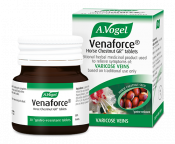An introduction to itchy varicose veins
Varicose veins develop when valves inside veins become damaged. This leads to a disturbance in blood flow, making it more difficult for blood to return from the area affected (usually the legs) to the heart. Blood stagnates and the affected vein swells as blood ‘pools’ inside the vein.
Used blood, high in a variety of toxins including lactic acid and carbon dioxide, accumulates. At the same time, increased pressure inside a varicose vein causes blood to leak out of the circulatory system.
The result of all this is that the vein and surrounding tissue becomes irritated, leading to symptoms such as itching and later, pain or tenderness.
Progression to varicose eczema
Over time, blood leaking into the tissues surrounding the vein damages the skin above. Red blood cells that have leaked out disintegrate, depositing haemoglobin and other substances into the tissues and skin. This leads to a gradual darkening of the skin around the varicose vein and a condition known as varicose eczema.
Varicose eczema may be treated in the same way as other types of skin conditions using moisturisers or steroid ointments applied to the area of irritation. However, this only soothes the discomfort, rather than treats the root of the problem.
A specific treatment for the varicose vein will more likely bring the most effective and long-lasting relief for varicose eczema.
Complications of itchy varicose veins
As the untreated varicose vein worsens, more blood and fluid leaks out into the surrounding tissues and collect under the skin. This increases the level of damage and eventually, the development of a skin ulcer known as a varicose or venous ulcer.
Small blood clots may also develop. Although each will not tend to be serious, if a few form in succession or if one forms at a venous junction or in the deep veins of the leg, further disruption to the flow of blood back to the heart will occur, worsening the condition.
Some people may also experience cramps in their legs or feet, particularly at night. This is thought to be the result of muscles working harder to improve circulation, or because of the build up of toxins in the veins.
Other people may complain of restless legs, a condition which makes it difficult to keep the legs still, with the need to constantly move the legs to relieve a feeling of tiredness or tension in the muscles.








